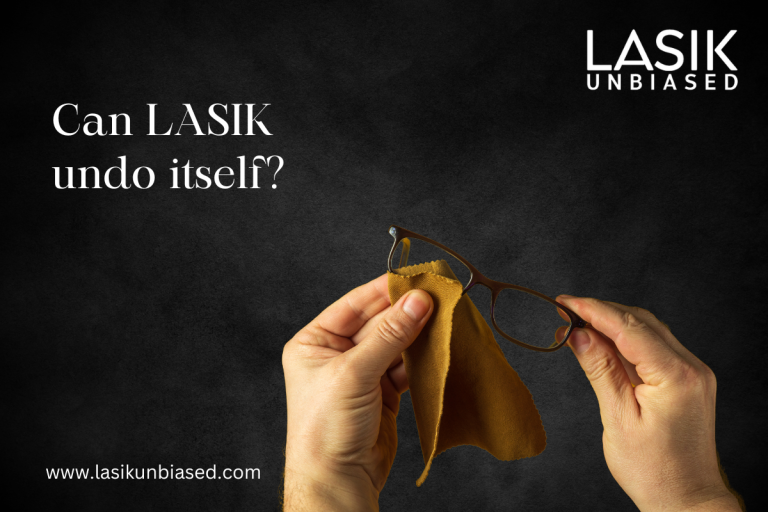LASIK surgery is a highly effective procedure that corrects refractive errors such as myopia, hyperopia, and astigmatism by reshaping the cornea. However, one of the common concerns among patients is whether LASIK can “undo itself” over time.
While LASIK provides long-lasting vision correction, various factors can still cause vision changes. Understanding the reasons behind these changes can help patients manage their expectations and make informed decisions about their eye health.
Is LASIK a Permanent Solution?
LASIK is designed to be a permanent procedure because the laser reshapes the cornea to correct vision errors. The removed corneal tissue does not grow back, meaning the structural changes made during the procedure remain stable. However, vision changes can still occur due to natural aging processes or other eye conditions, which may make it seem like LASIK results are reversing.
Why Do Some People Experience Vision Changes After LASIK?
Although LASIK is intended to provide long-term vision correction, several factors can contribute to vision changes over time:
Natural Aging of the Eyes (Presbyopia)
One of the most common reasons people notice a decline in their vision after LASIK is presbyopia, which typically begins around 40. This condition occurs because the eye’s natural lens loses flexibility, making it harder to focus on close objects. Since LASIK reshapes the cornea and does not affect the lens, presbyopia can still develop, requiring reading glasses or additional vision correction.
Regression After LASIK
Some patients experience regression, where their vision slightly shifts to their original prescription. This can happen when the corneal tissue undergoes slight remodeling after surgery. Regression is more common in individuals with high prescriptions before LASIK, as their corneas undergo more significant reshaping. While regression is usually mild, some patients may require an enhancement procedure to fine-tune their vision.
Corneal Healing and Thickness Changes
The healing process after LASIK can sometimes cause slight changes in corneal shape, affecting vision clarity. While most patients stabilize within three to six months, a small percentage may experience subtle shifts in prescription due to corneal remodeling.
Hormonal Changes and Medical Conditions
Certain medical conditions and hormonal fluctuations can affect vision stability. Pregnancy, diabetes, and thyroid disorders, for example, can cause temporary or permanent changes in vision. These changes are unrelated to LASIK but may make it seem like the procedure has “worn off.”
Eye Strain and Lifestyle Factors
Spending excessive time on digital screens, exposure to harsh environments, and inadequate eye care can contribute to vision fluctuations. While these factors do not undo LASIK, they can cause temporary vision disturbances that may be mistaken for regression.
Can LASIK Be Repeated If Vision Changes?
A LASIK enhancement procedure may be an option for patients experiencing significant vision changes after LASIK. This involves performing a second LASIK surgery to refine vision correction. However, enhancement procedures depend on factors such as corneal thickness, eye health, and the severity of the vision changes.
How Common Is LASIK Regression?
Studies suggest that LASIK regression occurs in a small percentage of patients, with most individuals maintaining stable vision for decades. The likelihood of regression depends on factors such as:
- Age at the time of surgery – Younger patients with high prescriptions may experience more regression.
- The severity of the original prescription – Higher prescriptions require more corneal reshaping, increasing the chance of slight changes over time.
- Healing response – Each person’s corneal healing process varies, impacting long-term vision stability.
Can Eye Exercises or Glasses Prevent Regression?
Eye exercises do not reverse or prevent vision changes after LASIK. However, wearing glasses or contact lenses can help correct any minor regression if needed. Optometrists may sometimes recommend reading glasses or prescription lenses for specific tasks, mainly as presbyopia develops with age.
What Can Be Done to Maintain LASIK Results?
While LASIK results are primarily permanent, maintaining overall eye health can help preserve vision quality:
- Attend regular eye check-ups to monitor vision changes and address any concerns early.
- Maintain good eye hygiene and avoid excessive screen time to reduce strain.
- Manage underlying health conditions such as diabetes or hormonal imbalances that may affect vision.
LASIK does not “undo itself,” but vision changes can still occur due to aging, medical conditions, or natural healing processes. While most patients enjoy long-term clear vision, some may experience mild regression over time. Fortunately, LASIK enhancements or prescription eyewear can help maintain vision clarity. Consulting with an ophthalmologist is the best way to determine the cause of vision changes and explore appropriate solutions.


